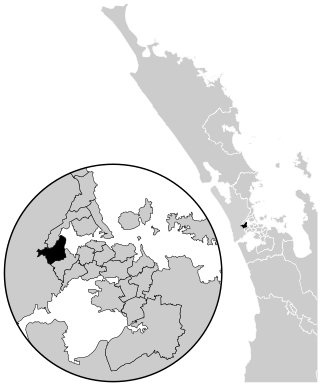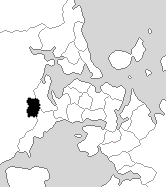
The 1978 New Zealand general election was a nationwide vote to elect the 39th New Zealand Parliament. It saw the governing National Party, led by Robert Muldoon, retain office, but the opposition Labour Party won the largest share of the vote. Reorganisation of the enrolment system caused major problems with the electoral rolls, which left a legacy of unreliable information about voting levels in this election.

The 1969 New Zealand general election was a nationwide vote to determine the shape of Parliament's 36th term. It saw the Second National Government headed by Prime Minister Keith Holyoake of the National Party win a fourth consecutive term. This is the most recent election where an incumbent government won a fourth term in office.
Albany was a New Zealand electorate. It was located in north Auckland, and named after the suburb of Albany. It existed from 1978 to 1984, and then was reinstated in 1987 before its final abolition in 2002.

Māngere is a New Zealand parliamentary electorate, returning one member of parliament to the Representatives of New Zealand. The current MP for Māngere is Lemauga Lydia Sosene of the Labour Party. She has held this electorate since 2023.

Rodney was a New Zealand parliamentary electorate, returning one Member of Parliament to the House of Representatives. The last MP for Rodney was Mark Mitchell of the National Party. He held this position from 2011 until the electorate was replaced with Whangaparāoa in 2020. Mitchell stood for and won that seat.

Rotorua is a New Zealand parliamentary electorate, returning one Member of Parliament to the New Zealand House of Representatives. It was first established in 1919, and has existed continuously since 1954. The current MP for Rotorua is Todd McClay of the National Party, who won the electorate in the 2008 general election from incumbent Labour MP Steve Chadwick.

Te Atatū is a parliamentary electorate, returning one Member of Parliament to the New Zealand House of Representatives. The current MP for Te Atatū is Phil Twyford of the Labour Party.

Waitakere was a parliamentary electorate, returning one Member of Parliament to the New Zealand House of Representatives. The electorate was first formed for the 1946 election and existed until 2014, with breaks from 1969 to 1978 and from 1987 to 1993. The last MP for Waitakere was Paula Bennett of the National Party, who had held this position since the 2008 election.

Whangārei is a New Zealand parliamentary electorate that was first created for the 1972 election. The electorate is usually a reasonably safe National seat, and was held for long periods by John Banks (1981–1999) and Phil Heatley (1999–2014), before being won in the 2014 election by Shane Reti. In the 2020 election Reti narrowly lost the seat to Labour's Emily Henderson. Reti would reclaim the seat at the 2023 election with a huge majority.
Waitemata was a New Zealand parliamentary electorate, from 1871 to 1946, and then from 1954 to 1978. It was represented by 18 members of parliament.
Titirangi is a former New Zealand parliamentary electorate. It existed from 1987 to 2002, with a break from 1996 to 1999. It was represented by four members of parliament, with three of them from Labour and one from National.
Hobson is a former New Zealand parliamentary electorate. It existed from 1946 to 1978 and then from 1987 to 1996, and was represented by five Members of Parliament, four of whom represented the National Party. It is notable for returning a member of the Social Credit Party in the 1966 election, as no other candidate not aligned with either Labour or National had been elected to Parliament since 1943. With the re-drawing of boundaries in the first MMP election in 1996, the seat was absorbed into the Northland and Whangarei electorates.
West Auckland is a former New Zealand parliamentary electorate on the western outskirts of Auckland, created for the 1984 election from part of the former Helensville electorate. The electorate was abolished for the 1993 election, and split between Henderson and Waitakere electorates.

Henderson is a former New Zealand parliamentary electorate, from 1969 to 1978 and then from 1993 to 1996.
Kaipara is a former New Zealand parliamentary electorate north of Auckland that existed from 1902 to 1946, and from 1978 to 1996.
Christchurch South was a parliamentary electorate in the city of Christchurch, New Zealand from 1881 to 1890 and then from 1905 to 1946.

Upper Harbour is a parliamentary electorate in Auckland that returns one member to the New Zealand House of Representatives. It was first formed for the 2014 election. The seat was won by National's Paula Bennett in both the 2014 and 2017 election. The seat was then held by Labour's Vanushi Walters in the 2020 election. The seat is currently held by National's Cameron Brewer since the 2023 general election.

Christopher Aidan Penk is a New Zealand politician who has been a Member of Parliament in the House of Representatives for the National Party since 2017.
Whangaparāoa is an electorate in the New Zealand House of Representatives. It was first created for the 2020 New Zealand general election and is represented by Mark Mitchell of the National Party; Mitchell had previously been the representative for the now abolished Rodney electorate.
Kaipara ki Mahurangi is an electorate to the New Zealand House of Representatives. It was created for the 2020 election.












